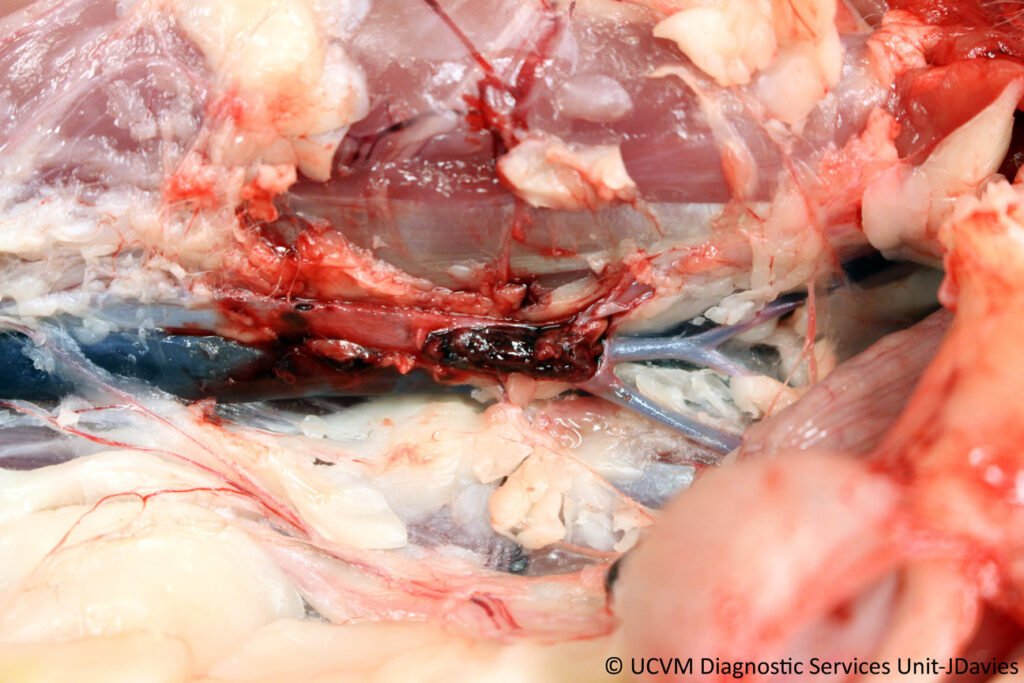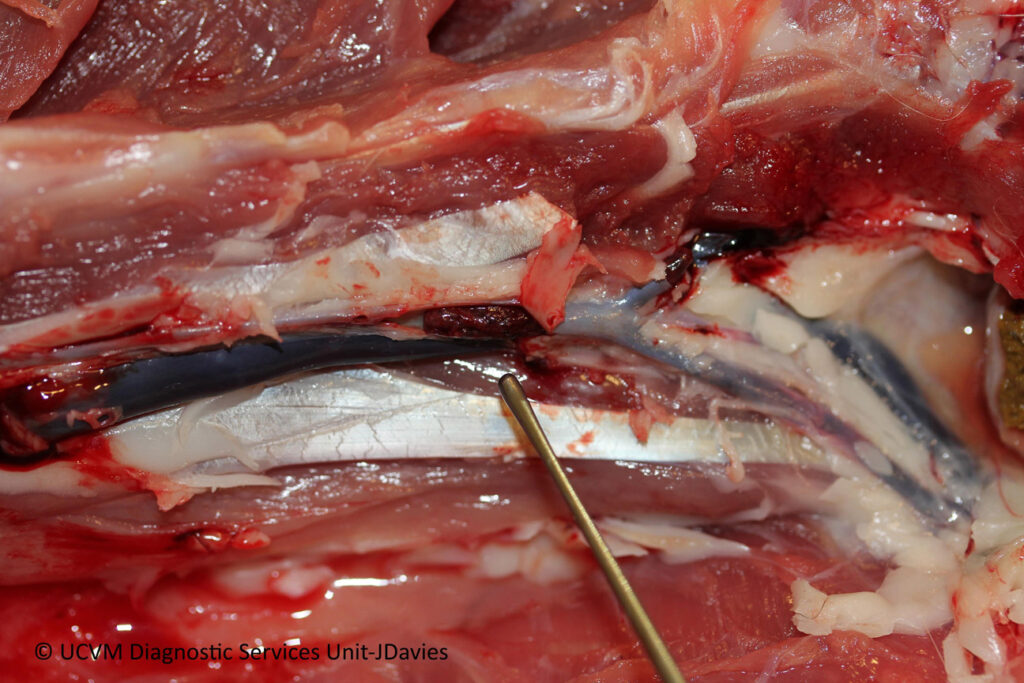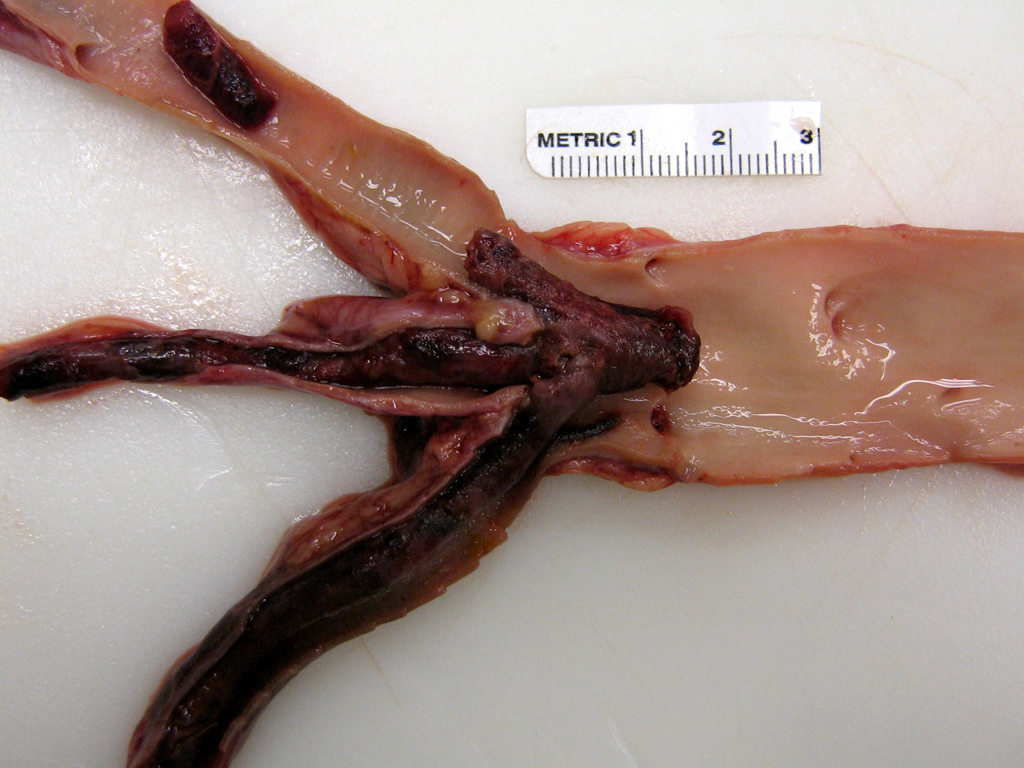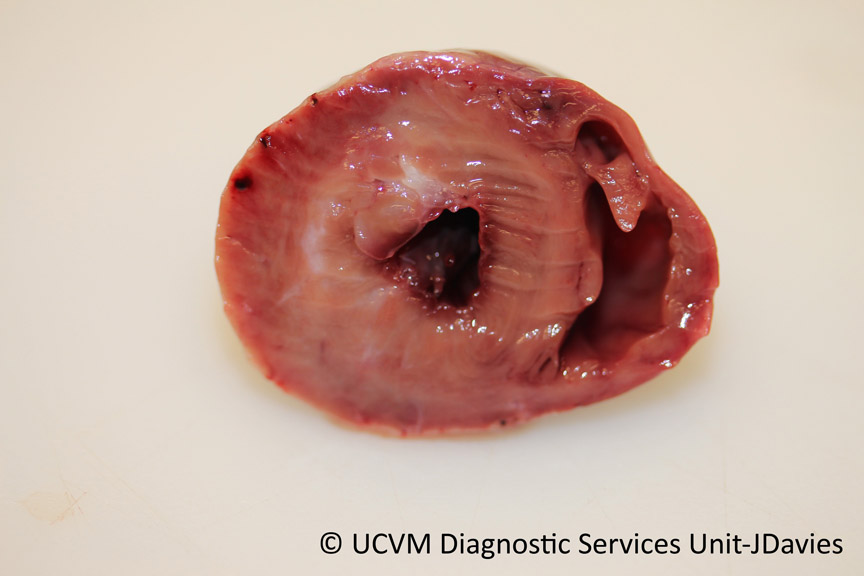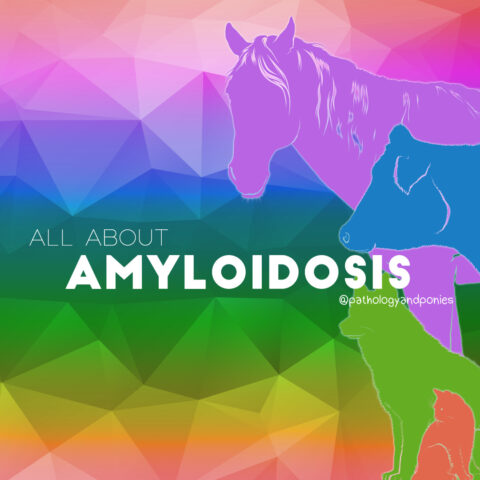Today’s path rounds are on 𝐬𝐚𝐝𝐝𝐥𝐞 𝐭𝐡𝐫𝐨𝐦𝐛𝐢, more scientifically known as 𝐟𝐞𝐥𝐢𝐧𝐞 𝐚𝐨𝐫𝐭𝐢𝐜 𝐭𝐡𝐫𝐨𝐦𝐛𝐨𝐞𝐦𝐛𝐨𝐥𝐢𝐬𝐦!
𝐖𝐡𝐚𝐭 𝐢𝐬 𝐢𝐭?
Aortic thromboembolism is when there is a blood clot that obstructs part of the aorta. In particular, this type of thrombus tends to lodge where the aorta splits into two arteries to run down each hind leg, an area referred to as the 𝐬𝐚𝐝𝐝𝐥𝐞.
𝐖𝐡𝐨 𝐠𝐞𝐭𝐬 𝐢𝐭?
This condition is almost exclusively seen in cats!
𝐖𝐡𝐚𝐭 𝐜𝐚𝐮𝐬𝐞𝐬 𝐢𝐭?
The major predisposing factor to this condition is heart disease, specifically 𝐡𝐲𝐩𝐞𝐫𝐭𝐫𝐨𝐩𝐡𝐢𝐜 𝐜𝐚𝐫𝐝𝐢𝐨𝐦𝐲𝐨𝐩𝐚𝐭𝐡𝐲. In this condition, the muscles of the heart become thickened with a small 𝐥𝐮𝐦𝐞𝐧, or space within the heart. This causes blood flow through the heart to become turbulent, which may predispose the cat to developing blood clots. These clots then move from the heart down the aorta, to cause a saddle thrombus.
𝐖𝐡𝐲 𝐢𝐬 𝐭𝐡𝐢𝐬 𝐚 𝐩𝐫𝐨𝐛𝐥𝐞𝐦?
Blocking the blood flow to an entire hind limb, or even both hind. limbs, has serious consequences. Not only is this immensely painful, but the reduced blood flow causes tissue 𝐧𝐞𝐜𝐫𝐨𝐬𝐢𝐬 (death of cells) which can lead to the skin sloughing and loss of muscle. If the clot is suddenly broken down or removed, the cat can suffer from a 𝐫𝐞𝐩𝐞𝐫𝐟𝐮𝐬𝐢𝐨𝐧 𝐢𝐧𝐣𝐮𝐫𝐲, which causes a sudden influx of large numbers of inflammatory cells trying to clean up the dead tissue, and producing 𝐨𝐱𝐢𝐝𝐚𝐭𝐢𝐯𝐞 𝐚𝐠𝐞𝐧𝐭𝐬 (a toxic waste product from clean up) that further damages the tissue.
𝐇𝐨𝐰 𝐢𝐬 𝐢𝐭 𝐝𝐢𝐚𝐠𝐧𝐨𝐬𝐞𝐝?
Cats presenting with saddle thrombi have 5 major clinical signs on affected hind limbs, referred to as the 5 Ps: pain, 𝐩𝐚𝐫𝐞𝐬𝐢𝐬 (weakness), pulselessness, 𝐩𝐨𝐢𝐤𝐢𝐥𝐨𝐭𝐡𝐞𝐫𝐦𝐲 (same temperature as the environment) and 𝐩𝐚𝐥𝐥𝐨𝐫 (pale tissues). Based on the clinical suspicion, the veterinarian will then take an X-ray or do an ultrasound to assess for the heart disease which underlies this condition.
𝐇𝐨𝐰 𝐢𝐬 𝐢𝐭 𝐭𝐫𝐞𝐚𝐭𝐞𝐝?
Treatment is largely centered around pain control and anti-coagulant drugs to prevent further thrombi and break down the existing one. Unfortunately, even with treatment, the prognosis for these cases is extremely poor, with a low chance of full recovery, so these cats are often euthanized.
𝐏𝐡𝐨𝐭𝐨𝐬
1-3) Examples of saddle thrombi seen at necropsy.
4) A cross-section of a heart with hypertrophic cardiomyopathy, which can lead to saddle thrombi. See how small the lumen of the heart is?
𝐒𝐨𝐮𝐫𝐜𝐞𝐬
Maxie, G. Jubb, Kennedy and Palmer’s Pathology of Domestic Animals, Volume 3. Sixth Edition.
Brooks, W. Feline aortic thromboembolism (FATE or saddle thrombus). Veterinary Partner, 2012.
Photos 1, 2 and 3 courtesy of University of Calgary Diagnostic Services Unit.
Photo 4 courtesy of Noah’s Arkive.

